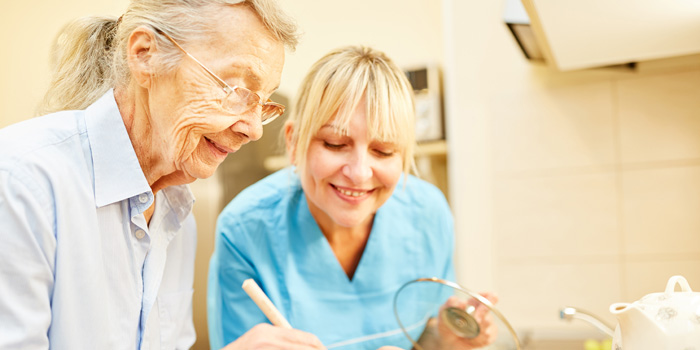NOTE: It is acknowledged that both mothers and fathers can have weight issues. For purposes of simplicity, we are only going to refer to your mother in this article. You can help Dad, too.
Extra weight can cause a lot more issues for senior citizens than it can for younger adults. Unfortunately, there are some senior citizens who are overweight, even obese.
If your loved one is overweight, it may be a good idea to learn how you can help a senior citizen to lose weight. They aren’t always the same strategies that younger adults would use.
Helping your elderly mother lose weight can be a challenging and sensitive task, but it can also improve her health and quality of life. Here are some steps you can take to support her weight loss journey:
Consult with her doctor.
Before starting any weight loss plan, it is important to rule out any medical causes of weight gain or difficulty losing weight, such as thyroid problems, diabetes, or medication side effects. Her doctor can also advise on the appropriate amount of weight loss and the best diet and exercise regimen for her age and health.
Encourage a high-protein, low-calorie diet.
Research shows that a high-protein, low-calorie diet is both safe and effective for older adults who want to lose weight. Protein can help preserve muscle mass, prevent sarcopenia (age-related muscle loss), and increase satiety (feeling full). Low-calorie foods can help create a calorie deficit, which is necessary for weight loss. Some examples of high-protein, low-calorie foods are lean meats, poultry, fish, eggs, dairy, beans, nuts, seeds, tofu, and quinoa.
Regular exercise.
Promote regular exercise with strength training. Physical activity can help burn calories, boost metabolism, improve mood, and prevent chronic diseases. Strength training can also help build and maintain muscle mass, which tends to decline with age. Some examples of exercises that are suitable for older adults are walking, swimming, cycling, yoga, tai chi, resistance bands, and light weights. Aim for at least 150 minutes of moderate-intensity aerobic exercise and two sessions of strength training per week.
Make healthy eating easy and enjoyable.
Older adults may face barriers to eating well, such as poor appetite, dental problems, difficulty swallowing, limited mobility, or lack of social support. You can help your mother overcome these challenges by preparing or buying nutritious meals and snacks that are easy to chew and swallow, appealing to her taste buds, and appropriate for her dietary needs. You can also encourage her to eat with you or other family members or friends to make mealtimes more pleasant and social.
Be supportive and positive.
Losing weight can be hard for anyone, especially for older adults who may have ingrained habits or emotional issues related to food. You can help your mother stay motivated and confident by being supportive and positive. Praise her efforts and achievements, celebrate her milestones, avoid criticizing or nagging her, and respect her choices and preferences. You can also join her in some of her healthy behaviors, such as exercising together or sharing a healthy meal.

